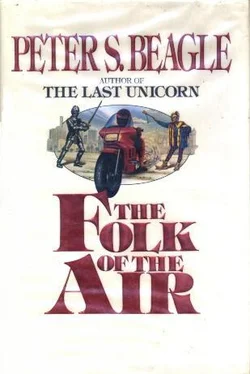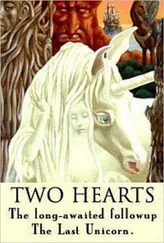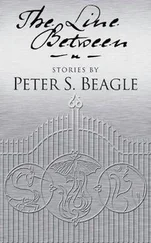Beyond her Farrell saw the gristly face of Garth de Montfaucon watching him with dispassionate, almost scholarly loathing. Farrell made a reverence to Julie, pointing his toes out and sinking into a rocking bow, while his hands inscribed magicianly arabesques at his breast. Julie smiled, answering him with a graver reverence of her own, holding out her hands.
He had never danced a coranto, but he had played many, and his feet always knew what his fingers knew; conversely, he could never dance anything that he could not play. The steps were those of a pavane, but a pavane created and performed by rabbits in moonlight instead of peacocks stalking, blue as salt on fire, along white walks under a Spanish noon. Farrell went hand in hand with Julie, copying her movements—the impatient little jump just before the beat, the pouncing advances and retreats, the eager, delicate landings. The music had thinned to a single crumhorn and the hoarse, scratchy drum. In the blowing kerosene light, Farrell saw the woman’s fingers flashing on the drum like rain.
When Julie let go of his hand and they danced backward, facing each other, he had a moment to study the dancers nearest to them. Most were his age or younger; a surprising number were unusually fat—though their flowing clothes either minimized this or boldly enhanced it—and if none knew less about the coranto than he did, only a few seemed that much better at it or that concerned with precision. A youth in classical greenwood dress wound out of the ragged aisle, advancing toward the musicians, his skinny legs improvising side kicks and caprioles with a kitten’s skittery, implacable energy. An older woman, wearing a huge yellow Elizabethan farthingale that made her look as if she were smuggling washing machines, danced tirelessly by herself to sliding steps with a soft-shoe, keeping almost perfectly to the shrill triple time. Off under a redwood at the edge of the clearing, three other couples were footing a practiced pattern of their own, a twining figure in which the men took turns weaving back and forth between the women, each man miming plaintive, respectful urgency. When the coranto ended, they all bowed and kissed one another, formal as china figurines, random and sensual as bending grass. Farrell kissed Julie on the strength of it.
The dancers did not applaud the musicians; rather, most of them turned and bowed toward the rude dais where the woman and the four clown-trousered men were already fallen into deep, slow reverences, the woman’s forehead almost touching her knee. Julie said, “The Lady Criseyde. She teaches the dances—everybody starts with her. Her husband’s the head of the Falconers’ Guild, Duke Frederik of Eastmarch.”
“Frederik the Falconer.” Farrell had heard Crof Grant speak the name. He spied the white-haired man swaying dreamily near the dais, swathed from throat to shinbone in a voluminous saffron garment the size of a foresail. It was bunched into a great tumbling bundle at the waist and thrown over his left shoulder to fall down his back like a toga. There was a short blue jacket wound into it somewhere, and two or three forlorn suggestions of a white shirt struggling to surface. Farrell said vaguely, “Scots wha‘ hae.”
The musicians were pooting experimentally again; the Lady Criseyde began softly to tap out the rhythm of another pavane. Julie put her arm under Farrell’s, and they took their places in a new line, standing between a Cavalier pair, all curls, feathers, laces, and rosettes, and a black couple in Saracen dress. Julie said, “You are attending at the King’s Birthday Revels of the League for Archaic Pleasures.”
Farrell looked over at the black woman, who smiled back at him, her soft, serious face wickedly ambushed by dimples. She was wearing mostly opalescent veils and a wide woven belt, and her hair was braided and beaded and tipped with gold. With the casual shock of a dream, Farrell recognized her companion from the green convertible; he was the young man who had so airily warded off Madame Schumann-Heink with his broadsword. He winked at Farrell—a swift, glinting fingersnap of a wink—before turning away, stately and alone among Crusaders.
The pavane was danced in the Spanish style, which had Farrell hopelessly adrift within a dozen bars. It was an unfamiliar air, a good deal livelier than the English paces he knew, and he wandered in and out of the measures in lonesome embarrassment. For all that, he went wistfully when Julie led him away to sit on the grass in the lee of the dark pavilion. “I was getting it,” he said. “It’s just been a while, is all.”
Julie did not answer him, but watched the dances, one hand plucking absently at clover stems. Speaking quietly, without turning her head, she asked, “Have you chosen a name yet?”
“Don’t need one. None but a king’s virgin daughter may know my name until sunrise.”
She turned on him swiftly then, saying, “Don’t be a fool. I meant what I told you about names being important. Joe, pay attention for once.”
Irritated himself, he answered, “Pay attention to what? Come on, Jewel, some fancy folk-dancing outfit calls itself the League for Artsy Amusements—”
“Archaic Pleasures,” Julie said. “Incorporated, with fourth-class mailing privileges.” Her eyes were on the pavane again, and her fingers had never left their blind work in the cold grass. “And they aren’t folk dancers.”
“Oh, right,” Farrell said. “They have wars over the queen’s garter belt. I forgot. What else do they do?”
“It was the War of the Queen Mother’s Boots—and it was a very serious matter.” She began to laugh, leaning against him. “They stage tilts,” she said. “Tournaments. That’s what that helm was for, and the chain mail.”
“You mean jousting?”
Julie shook her head. “Not jousts. Jousts are on horseback, and it just gets too dangerous. But they have all the rest of it—sword fights, quarterstaff matches, shooting at the wand, even mêlées .” The torchlight turned the dancers and musicians to slippery bronze shadows; the darkness made momentary candles of kirtles and plumes. Julie went on, “It isn’t all fighting, like Hyperborea. Some of the men never fight at all—they join for the music or the dressing up, they become bards, they do research on heraldry, calligraphy, court procedure, even on the way people cooked and the games they played. But there wouldn’t be a League without the tilts.”
Prowling gracefully by with a very young girl in a plain blue houppelande, Garth de Montfaucon looked over his shoulder at them. Farrell said, “Hyperborea?”
“That’s the Sacramento chapter. There’s another one in Los Angeles, the Kingdom Under the Hill. We are the Kingdom of Huy Braseal.”
She said the name with a slightly mocking flourish, but Farrell felt a sudden odd little shiver inside himself, a dainty tickle of ice under his skin. He had felt it earlier, in the moment when Garth’s sword had whimpered from its sheath. He asked, “Since when have you been mixed up with all this? How long have these people been around?”
“Ten or twelve years. Huy Braseal, anyway—the others started up later.” Two huge Afghan hounds, one black, one golden, lolloped among the dancers, their grinning loutishness and primrose eyes somehow turning the pavane altogether into a tapestry fragment glowing far away. Julie said, “I’ve been involved for a couple of years, on and off. Nancy got me into it, the Lady Criseyde. She’s in Graduate Admissions.”
Farrell said slowly, “The armor on your bed, that was real. What about the swords and axes and stuff?”
“Rattan, mostly. It’s like wicker, only heavier. A few people still use regular softwood, I think—pine and so on.”
“Not old Sir Turkish Delight,” Farrell said. “The boy with the trick mustache. That was a realie he was waving around.”
Читать дальше












